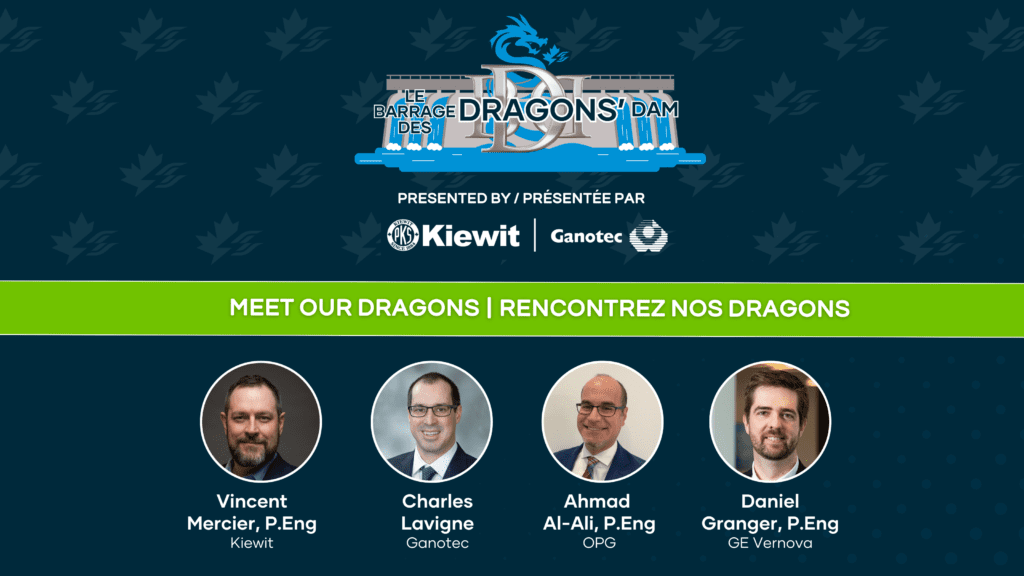The countdown is on! The WPC Dragons’ Dam competition presented by Kiewit & Ganotec will take place live during Canadian Waterpower Week 2025 (October 1–3 in Ottawa). This national student competition is designed to spotlight creativity and innovation, with Canada’s brightest engineering students pitching their solutions to real-world waterpower challenges.
The top three teams will present their ideas on stage, but not just to any audience. They’ll face the WPC Dragons, a panel of esteemed industry leaders who will evaluate, challenge, and ultimately help select the winning teams.
Before the competition kicks off, we’re excited to introduce this year’s Dragons.
Vincent Mercier, P.Eng
Department Director of the Hydropower, Dams & Hydraulic Structures Teams | Kiewit
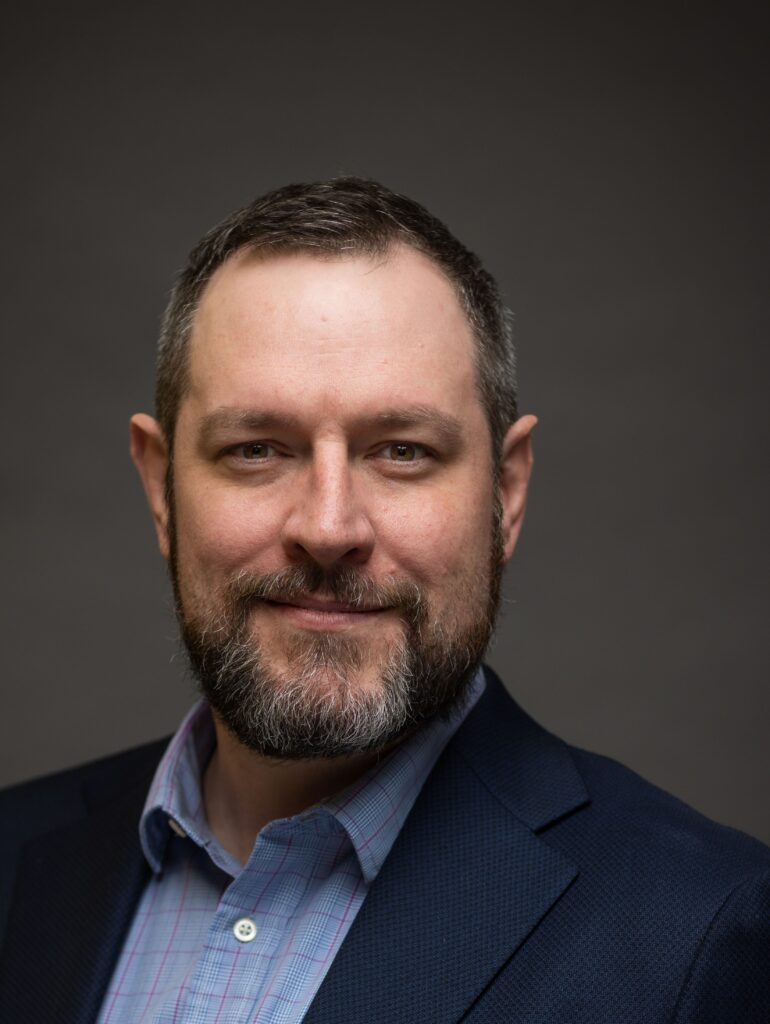

Vincent Mercier brings over 20 years of experience in hydropower, spanning greenfield developments, brownfield upgrades, operational support, and R&D initiatives. As Kiewit Engineering’s Hydropower, Dams and Hydraulic Structures Department Manager and a Senior Design Manager, he has partnered with public and private developers, utilities, investors, consulting firms, operators, and contractors.
From pre-feasibility studies to detailed design and construction follow-up, Vincent has built a reputation for combining deep technical insight with a collaborative mindset. His rare perspective on the full lifecycle of hydropower projects positions him as a trusted leader in navigating the technical, financial, and regulatory complexities of the industry.
Q&A Spotlight with Vincent
What’s one innovation in hydropower or clean energy that excites you most right now?
Small-scale and fringe pumped-storage hydro technologies (axial PSH turbines, high density liquid systems, underground pressurization of water)
What’s the boldest idea you’ve seen succeed in your career?
Prefabrication of powerhouse superstructure components to prevent delays after a work stoppage at Rapide-des-Coeurs and Chute Allard powerplant constructions. The components were later embedded in the concrete of the powerhouse infrastructure.
If you could give one piece of advice to the next generation of engineers, what would it be?
Whatever you want to do in your careers, go to site and make sure you have mud on your boots early in your careers. Understanding how it’s actually built, as well as a work-site environment (including work site politics) will make you a better engineer!
In one word, how would you describe the future of Canada’s hydropower industry?
Busy! Very very busy! There have been investment announcements for more work in the next 20 years than there are people in the industry able to deliver. Plus there is a whole tranche of senior professionals eager to share their wisdom who will retire in the next 10 years, time to come help and learn from these great teachers.
What’s the most valuable lesson you’ve learned from working on major projects?
Hydropower projects are some of the most complex projects out there. Very few projects require so much integration of so many disciplines into a wholesome end-product. Plus every site is absolutely unique. You’ll never do the same thing twice in your career.
When you were a student, what kind of project would you have pitched at WPC Dragons’ Dam?
I was fascinated with pumped storage hydro when I started. I would have tried to pitch a small PSH project in Canada, probably a small isolated community, to connect with solar and wind.
Coffee or tea before a big pitch?
An entire pot of coffee. Plus, I use the “power pose” technique. Want to know more about that one? Watch this: https://www.youtube.com/watch?v=Ks-_Mh1QhMc. It works!
What’s one “non-engineering” skill that helps you most in your career?
I don’t know if it’s a skill, but empathy… being able to understand and put myself in the skin of other project stakeholders really helps me make more sense of situations and be a better contributor in resolving issues and problems.
What’s your favourite “lightbulb moment” when a complicated idea finally clicked?
As a young engineer, I needed to perform the design of a complicated reinforced concrete wall. I did a FEM and a hand calculation to prove the FEM results were good. The hand calc required that I do a triple integration (by hand mind you). My supervisor took me aside to teach me a good lesson: while he was impressed with my maths, he told me that effort was probably wasted. He invited me not to try to get the right answer all the time. Sometimes engineering it down to the right/optimal answer is too expensive and too time consuming when compared to the actual construction work cost. Just make sure you achieve an “acceptable” answer, even if not optimal… the time you save is sometimes worth more than what you’ll save in construction costs. Do check that with the people who build before deciding though.
Charles Lavigne
Operations Manager | Ganotec
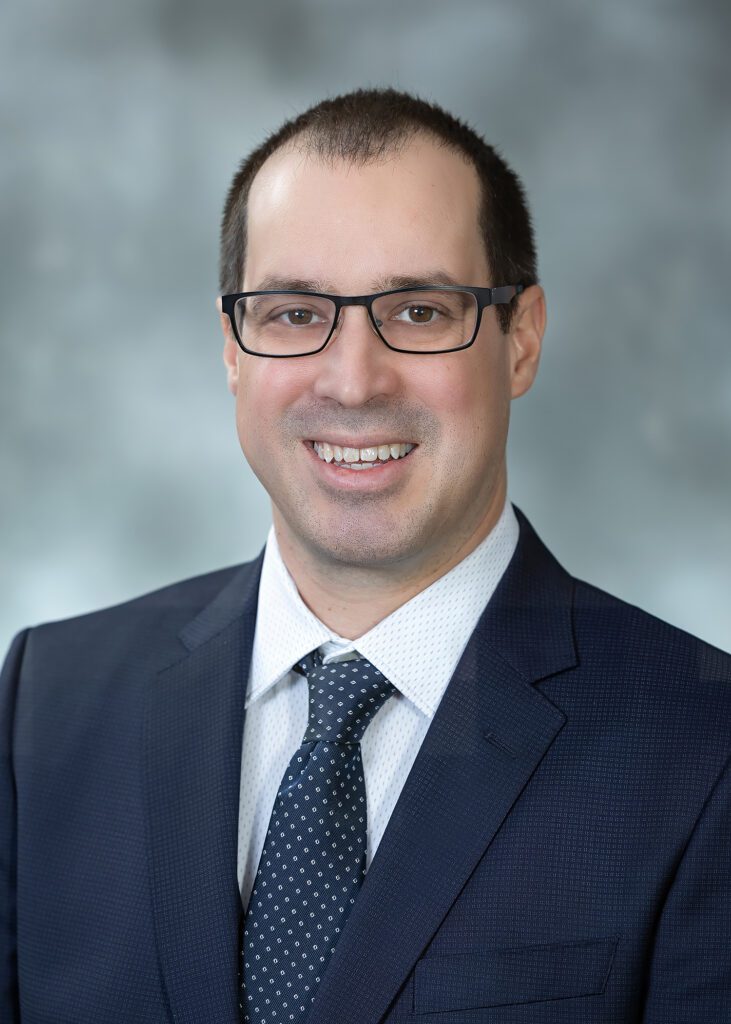

Charles Lavigne is the Operations Manager at Ganotec, a subsidiary of Kiewit, with over 15 years of experience in the hydropower and industrial sectors across Canada and the United States. His background includes greenfield developments, brownfield upgrades, and complex plant expansions, delivered under ECI, EPC, and bid-build frameworks.
Charles is known for his proactive approach to safety and constructability, ensuring that early planning leads to efficient execution. He brings a sharp focus to schedule and cost performance, consistently driving value for clients. His leadership style blends strategic oversight with a deep understanding of field realities, making him a trusted partner across all phases of project delivery.
Q&A Spotlight with Charles
What’s one innovation in hydropower or clean energy that excites you most right now?
Honestly, I’m really excited about how AI is being used to optimize design, planning, construction, up to operations and maintenance. It’s not just about efficiency; it’s about making smarter decisions.
What’s the boldest idea you’ve seen succeed in your career?
I once worked on a project where we decided to install a stay ring out of sequence, with a huge gantry crane, almost at the beginning of the project. It was challenging and complicated, but the results were incredible for advancing the schedule.
If you could give one piece of advice to the next generation of engineers, what would it be?
Stay curious and don’t be afraid to ask questions. The best engineers I’ve worked with aren’t just smart, they’re humble enough to keep learning and ask a lot of questions.
In one word, how would you describe the future of Canada’s hydropower industry?
Legacy.
Every project we work on today; whether it’s modernizing a dam, improving grid integration, or expanding storage is laying the foundation for future generations. Hydropower has deep roots in Canada, and what excites me is how we’re evolving that legacy to meet tomorrow’s challenges. It’s not just about producing clean energy now, it’s about ensuring our kids and grandkids inherit a system that’s reliable, sustainable, and ready for what’s next.
What’s the most valuable lesson you’ve learned from working on major projects?
That people matter just as much as plans. You can have the best strategy on paper, but if your team isn’t aligned or motivated, it won’t go far. Building trust and communication is key.
When you were a student, what kind of project would you have pitched at WPC Dragons’ Dam?
Probably something like a portable micro-hydro unit for off-grid regions, something simple that could power few houses.
Coffee or tea before a big pitch?
Coffee. Always coffee.
What’s one “non-engineering” skill that helps you most in your career?
Listening. It sounds simple, but being able to really hear what people are saying; whether it’s a client, a colleague, or a stakeholder. It makes a huge difference.
What’s your favourite “lightbulb moment” when a complicated idea finally clicked?
I was deep into a project, staring at a spreadsheet that looked like it had been designed by a cryptographer. After hours of trying to make sense of it, I realized I’d been using the data all wrong the entire time. One quick fix and suddenly everything aligned perfectly!
Ahmad Al-Ali, P.Eng
Director, Hydro Development – Business Development & Corporate Affairs | Ontario Power Generation (OPG)
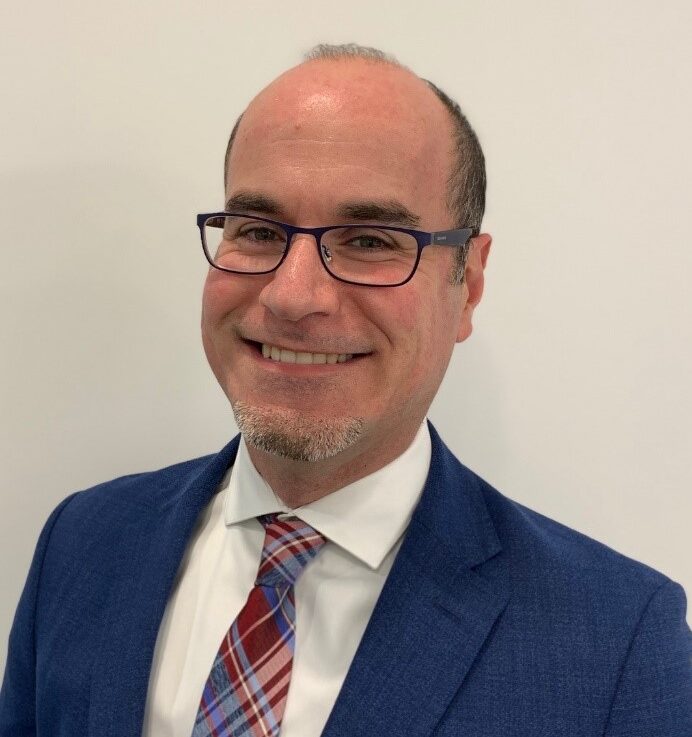

Ahmad Al-Ali is the Director of Hydro Business Development at Ontario Power Generation (OPG), one of North America’s largest and most diverse electricity generators and a leader in clean technology innovation. With over 19 years of experience in the power and energy transition industry, Ahmad leads OPG’s efforts to expand its large-scale hydroelectric portfolio by unlocking untapped potential in Northern Ontario and enhancing existing generating stations.
Throughout his career, Ahmad has led major strategic initiatives across Hydroelectric & Renewable Generation, Electrification, Business Development, Asset Management, and Plant Operations. He holds a Bachelor of Engineering from McMaster University and a Master of Engineering from the University of Waterloo. Guided by OPG’s vision to ‘electrify life’ within a generation, Ahmad is passionate about the waterpower industry and driving sustainable energy solutions for the future.
Q&A Spotlight with Ahmad
What’s one innovation in hydropower or clean energy that excites you most right now?Co-location of hydro plants with other technologies (e.g. wind and BESS).
What’s the boldest idea you’ve seen succeed in your career? Integration of AI tools in our industry.
If you could give one piece of advice to the next generation of engineers, what would it be? Be curious, listen to the clients and communities you work with, and be deliberate in driving your professional development.
In one word, how would you describe the future of Canada’s hydropower industry? Enduring.
What’s the most valuable lesson you’ve learned from working on major projects? Importance of establishing a ONE TEAM culture at the start of these projects to have a forward-thinking and solution-oriented mindset.
When you were a student, what kind of project would you have pitched at WPC Dragons’ Dam? 20 years ago – energy conservation.
Coffee or tea before a big pitch? Always coffee.
What’s one “non-engineering” skill that helps you most in your career? Listening and being curious about the other person’s perspective.
What’s your favourite “lightbulb moment” when a complicated idea finally clicked? When I was helping trouble shoot a 115kV step-up transfer under a forced outage and trying to inservice a failed 115kV bushing we kept getting failed result on one of the key replacement bushing. This was a $2M piece of equipment. Stepping back and looking at the environment I asked the crew to take a coffee break and went back to looking at my notes realizing the high level of humidity. This triggered an idea that humidity was causing the false reading. I called the crew back and we pushed ahead, leading to a successful return to service. Key lesson to pause, think and be self-aware.
Daniel Granger, P.Eng
Head of Commercial Operations – North America & VP GE Renewable Energy Canada
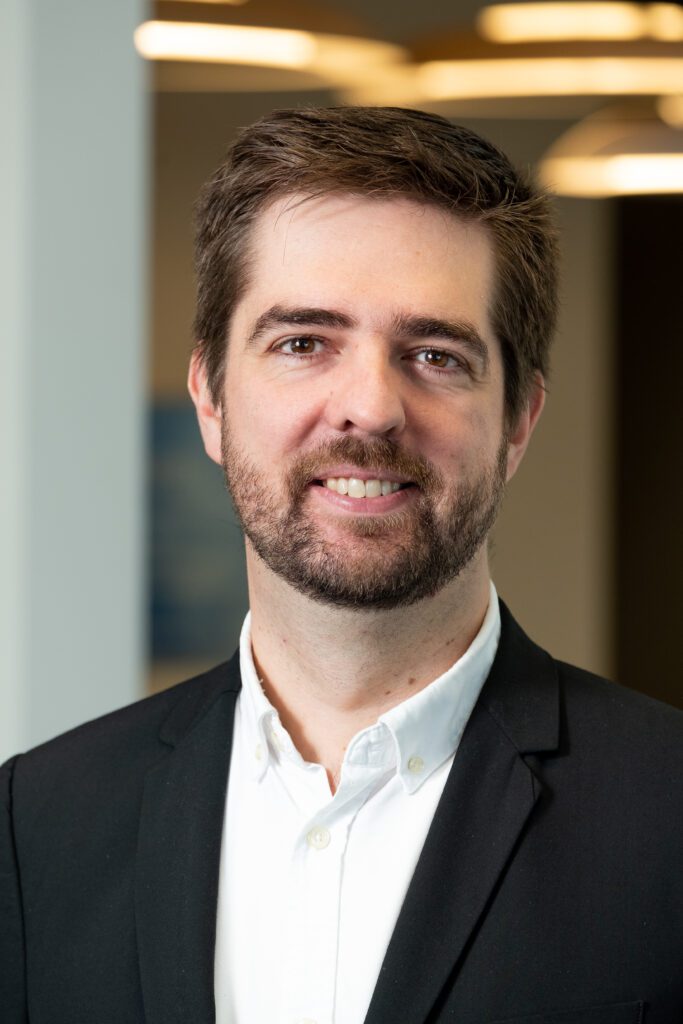

After earning a bachelor’s degree in mechanical engineering and a master’s degree in applied mechanics from École Polytechnique de Montréal, Daniel began his engineering career at Alstom, which was acquired by General Electric in 2015. After three years in a technical role, he became Senior Proposal Manager in the commercial team, a position he held for nearly ten years, working on proposals for major Canadian and US projects. In 2020, Daniel became Senior Sales Director for Eastern Canada, and then for all of Canada in 2022.
Daniel holds an Executive MBA from McGill-HEC. He has been a member of the Board of Directors of Water Power Canada since 2020. He is also a Board member of the Association de l’industrie électrique du Québec (AIEQ).

